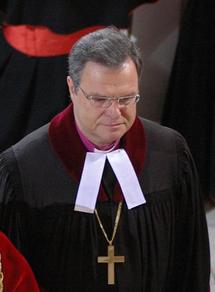
The committee report would be presented to church elders who would then decide what action to take, Cieslar said.
Some senior Lutheran clerics have already called for Jagucki, 62, to be removed as head of the church.
A special committee was set up by the Church last September 2008 to probe the record of its clerics and lay members under Poland's four-decade communist regime which collapsed in 1989.
The allegations against Jagucki arose when his Sluzba Bezpieczenstwa (SB), or secret police files, were made public by the conservative Polish daily Rzeczpospolita last year.
According to published extracts, Jagucki was registered as a "secret collaborator" by SB forces for 17 years from 1966.
Jagucki, 62, has acknowledged that he met with SB operatives on several occasions, but denies ever having been an agent or having harmed anyone.
The SB's files are held by the Institute of National Remembrance (IPN), the body created in 1998 to prosecute crimes dating from both the communist era and Nazi Germany's World War II occupation of Poland.
Lutheranism is the faith of around 80,000 people in Poland, mostly clustered in the southwestern region of Silesia.
More than 90 percent of Poland's 38 million people are Roman Catholics.
The issue of ties between the SB and the clergy has also tarnished the image of the Roman Catholic Church, which was seen as a bulwark against Poland's 1944-1989 communist regime.
According to various sources, between 10-15 percent of Roman Catholic clergy collaborated with the SB, informing on parishioners and other clerics.
The Roman Catholic Church recently closed an historical commission focused on probing its members' past.
The SB was all-powerful under the former regime, and used a mixture of favours and threats to push people to become informers.
Encounters with its agents were inevitable for many Poles at the time -- to obtain a passport, for example -- and many such meetings left traces in the archives whether or not an individual had agreed to help the force.
-------------------------------------------------------------------------------
Some senior Lutheran clerics have already called for Jagucki, 62, to be removed as head of the church.
A special committee was set up by the Church last September 2008 to probe the record of its clerics and lay members under Poland's four-decade communist regime which collapsed in 1989.
The allegations against Jagucki arose when his Sluzba Bezpieczenstwa (SB), or secret police files, were made public by the conservative Polish daily Rzeczpospolita last year.
According to published extracts, Jagucki was registered as a "secret collaborator" by SB forces for 17 years from 1966.
Jagucki, 62, has acknowledged that he met with SB operatives on several occasions, but denies ever having been an agent or having harmed anyone.
The SB's files are held by the Institute of National Remembrance (IPN), the body created in 1998 to prosecute crimes dating from both the communist era and Nazi Germany's World War II occupation of Poland.
Lutheranism is the faith of around 80,000 people in Poland, mostly clustered in the southwestern region of Silesia.
More than 90 percent of Poland's 38 million people are Roman Catholics.
The issue of ties between the SB and the clergy has also tarnished the image of the Roman Catholic Church, which was seen as a bulwark against Poland's 1944-1989 communist regime.
According to various sources, between 10-15 percent of Roman Catholic clergy collaborated with the SB, informing on parishioners and other clerics.
The Roman Catholic Church recently closed an historical commission focused on probing its members' past.
The SB was all-powerful under the former regime, and used a mixture of favours and threats to push people to become informers.
Encounters with its agents were inevitable for many Poles at the time -- to obtain a passport, for example -- and many such meetings left traces in the archives whether or not an individual had agreed to help the force.
-------------------------------------------------------------------------------









 Home
Home Politics
Politics









